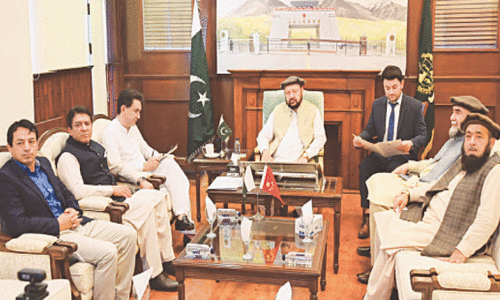HYDERABAD, Aug 30: Human security cannot be achieved only through fulfilment of basic economic needs because there are cultural, social and political rights, as well as other needs, which are no less important than economic rights.
This was stated by Professor (Dr) Syed Sikander Mehdi of the University of Karachi's international relations department in a paper on "Peace research, peace movement and human security" he read out at an international conference on "Human security: global and regional perspectives" at the University of Sindh on Monday.
The conference was organized by the international relations department of the University of Sindh in collaboration with the Hanns Seidel Foundation and the Karachi University's international relations department.
Scholars from different universities of the country and abroad, including Bangladesh, China, Kazakhstan and Russia, attended the conference. Professor Mehdi observed that there was a world even before September 11, 2001.
It was a world where visionaries, thinkers, scholars, human rights activists and champions of political, economic, social and cultural rights lived and waged a long and fearless campaign for peace, non-violence, justice, human dignity and happiness.
He said that the analysis of security discourse in the media in general and academia in particular, and even a cursory glance at declaratory statements of states, indicated that the concept of human security was gaining ground.
"Ideas rise and fall like empires", he Quoted Richard Falk and said the quest for peace took roots gradually to challenge a dominant viewpoint. "Gone are the days when scholars and policy-makers had little hesitance in almost religiously adhering to the manipulative, myopic, state centric and highly militarized concept of security and accepting it as a theology of power, security and survival," he observed.
Time has changed now and old concepts are under assault, giving way to new paradigms. He said that while the territorial state was withering away fast, the national security state was also on the decline, adding that the stress was on human security now.
Former foreign secretary Najamuddin Shaikh, who inaugurated the conference, said traditional, or at least conventional notions, of security focused largely on security of nation state.
However, he said, there seemed to be a shift in the last decade of the last century after the disintegration of the Soviet Union and virtual elimination of a threat of a nuclear holocaust. He said it then appeared that the notion of human security as a guarantor of national security was beginning to take hold.
He said this belief was, however, resisted and added that even before the event of September 11, the idea of a genuinely empowered United Nations, committed to a more just international order, had begun to lose support.
After September 11, Mr Shaikh said, even strong supporters of human security believed that it could only flow from national security. He was of the opinion that national security would, therefore, continue to be the determinant of external and domestic policies, even at the cost of human security.
Sindh University Vice-Chancellor Mazharul Haq Siddiqui observed that the concept of human security had shifted traditional imperatives of security policy away from defending the nation.
He said a state could not be secure if its citizens were unsafe, adding that the aim of human security was not the erosion of state power but to change it in accordance with human needs and aspirations.
Prof (Dr) Rafia A. Shaikh, dean of the faculty of social sciences, University of Sindh, said that security was usually referred to in the context of external threats to states. However, in the past two decades, a new paradigm - human security - has emerged.
Not that the world had become a global village, she said, all resources should be mobilized for creating an aura of mutual tolerance and cultural understanding among nations.
In his paper on "Comparative Analysis of Traditional Security and Human Security", Dr Parvez Iqbal Cheema, president, Islamabad Policy Research Institute, said human security implied freedom from perceived threats to human rights and physical safety. He said a state was expected to provide both physical as well as economic security to its citizens.
The resident representative of the Hanns Seidel Foundation, Islamabad, Dr Andreas Rieck, said in a brief speech that he had noticed strong national passions in Pakistan, which were natural as it had a powerful neighbour and long borders.
Dr Shaheen Afroz, senior research fellow, Institute of International and Strategic Studies, Bangladesh, presented a paper on "Human Security in Bangladesh: Discourse and Practice".
Prof Dr Mehtab Ali Shah of the University of Sindh spoke on "Threat to Human Security: The Case Study of Pakistan", while Syed Hussain Shaheed Suhrawardy of the University of Peshawar, read a paper on "Military Expenditures: Dimensions of India and Pakistan".












































